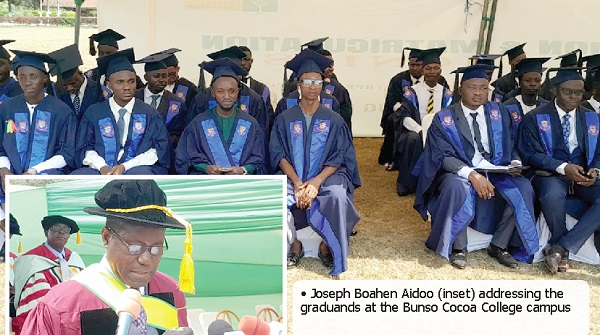A 39-year-old man, Abdulai Ismaila, who braved the odds and emerged the overall best student at the maiden graduation and matriculation of the Bunso Cocoa College, has been offered instant employment by the Ghana Cocoa Board (COCOBOD).
The college has been affiliated to the University of Cape Coast, and offers diploma programmes in Agronomy and Extension in Coffee and Cocoa Production.
The graduation ceremony, dubbed: “Raising the Manpower for Resilient Tree Crop Sector”, witnessed the passing out of 69 students, 21 of them obtaining First Class, while 14 grabbed Second Class Upper, and a further 31 got Second Class Lower.
Mr Ismaila, who secured First Class in Agronomy, Coffee and Cocoa Production, was given a standing ovation as he walked over for his academic scroll.
The Chief Executive Officer (CEO) of COCOBOD, Joseph Boahen Aidoo, praised Mr Ismaila for his academic performance, and instantly declared him an employee of COCOBOD.
He stated that Ghana’s economy highly depended on primary production of mining and agricultural produce, mainly cocoa, which were exported for foreign exchange.
He said the agricultural sector, which alone accounted for an average of 35 per cent of the country’s Gross Domestic Product (GDP), would continue to determine the success of Ghana’s development growth path.
Value addition
Dr Boahen said agriculture must, therefore, be seen as business and a value addition venture.
He indicated that the export of cocoa, gold and timber accounted for the bulk of mechanised exports.
He explained that until recently, agriculture, particularly small-scale agriculture, was viewed from the lenses of rural development, and that strategy had used agriculture as a tool to manage rural poverty.
He indicated that agriculture value chain was changing national policies, strategies, and programmes to attract investments, especially in export value chain, and stressed, however, that most small-holder participants in that sector remained under-invested.
Dr Boahen said although successive governments invested heavily in the agricultural sector, such investments had not yielded the necessary impact in terms of propelling the sector to drive the country’s economic development.
Dr Boahen explained that technology and research were the driving force needed for the transformation of the economy, and that the future of the agricultural sector was all about science, technology and education.
While congratulating the students and staff of the college, Dr Boahen stressed the need for the institution to broaden its scope of programmes it offered to include cocoa industrialisation, food nutrition and farm management.
He urged the management of the college to introduce innovative programmes that would produce the next generation of local engineers to transform the local cocoa processing sector through artisanal chocolate manufacturing.
Employment
The acting Rector of the Bunso Cocoa College, Dr Mercy Asamoah, encouraged companies, organisations and individuals, as well as the business community interested in developing the tree crop sector, especially cocoa, to offer employment for the graduands.
She also appealed to COCOBOD to consider offering employment either permanent or on contract basis to the graduands.
Dr Asamoah said the college’s infrastructure such as lecture rooms, constructed in 1950, had become old and inadequate, along with the boarding facilities. Other challenges, she stated, included staff bungalows and the lack of a fitting library.
She also appealed to COCOBOD to offer scholarship for graduands intending to further their education.








